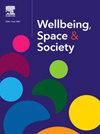Community influences on trust in Swedish healthcare
IF 2.2
Q2 GEOGRAPHY
引用次数: 0
Abstract
A lack of trust in healthcare, often stemming from alienation or suspicion toward public institutions, may result in citizens forgoing essential support and treatments to which they are entitled and avoiding participation in preventive measures that benefit society as a whole. While the links between community characteristics and health are well established, this study aims to explore the influence of communities on trust in healthcare. Although trust in healthcare is generally high among the Swedish population, increasing diversity and segregation among neighborhoods make it relevant to examine variations in trust across local communities. Utilizing social capital theory, this study combines survey data from over 13,000 respondents with register data, linking individual data to local community characteristics through multi-level regression analyses. The findings reveal that individuals’ perceptions of their community have a stronger association with healthcare trust than the objective characteristics measured in the study, with community pessimism emerging as a significant factor, particularly for residents with a migrant background. Furthermore, it underscores the importance of understanding and distinguishing between community-level determinants of trust and how they differ between groups. Ultimately, this research will help identify neighborhoods with low healthcare trust and highlight the characteristics that correlate with diminishing trust, guiding targeted interventions.
社区对瑞典医疗保健信任的影响
对医疗保健缺乏信任,往往源于对公共机构的疏远或怀疑,这可能导致公民放弃他们有权获得的基本支持和治疗,并避免参与有利于整个社会的预防措施。虽然社区特征与健康之间的联系已经确立,但本研究旨在探讨社区对医疗保健信任的影响。尽管瑞典人口对医疗保健的信任度普遍较高,但社区之间日益增加的多样性和隔离使得研究当地社区之间信任度的变化具有重要意义。本研究运用社会资本理论,结合超过13000名受访者的调查数据和登记数据,通过多层次回归分析将个人数据与当地社区特征联系起来。研究结果显示,与研究中测量的客观特征相比,个人对社区的看法与医疗保健信任有更强的关联,社区悲观主义成为一个重要因素,特别是对于具有移民背景的居民。此外,它强调了理解和区分社区一级信任决定因素以及它们在不同群体之间的差异的重要性。最终,本研究将有助于识别低医疗信任的社区,并突出与信任减少相关的特征,指导有针对性的干预措施。
本文章由计算机程序翻译,如有差异,请以英文原文为准。
求助全文
约1分钟内获得全文
求助全文
来源期刊

Wellbeing Space and Society
Social Sciences-Social Sciences (miscellaneous)
CiteScore
2.70
自引率
0.00%
发文量
46
审稿时长
124 days
 求助内容:
求助内容: 应助结果提醒方式:
应助结果提醒方式:


